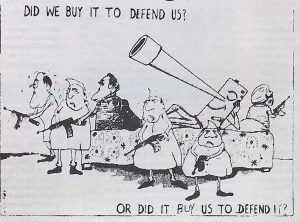
NEW DELHI: Allegations that Prime Minister Rajiv Gandhi is ‘one of the recipients of bribes paid in an arms deal have put his government on the defense as a national election approaches.
The allegations by a retired general, Krishaswami Sundarji, who was the army Chief of Staff in 1986 when a $1.4 billion purchase of Swedish artillery guns was made, have also added to a growing debate about demoralization in the Indian army.
Over the last few months, the army has suffered several blows to its reputation of professionalism. It is the world’s fourth largest fighting force, with 1.2 million active soldiers.
Indian peacekeeping troops have been accused of killing dozens of civilians in incidents in Sri Lanka and hundreds in Punjab that an Indian scholar has described as “horror stories of My Lai proportions.”
In July, soldiers went on a, rampage in Bikaner, an Indian, town in Rajasthan, shooting bystanders at a railroad station after an argument with the railway police and officials. The general’s accusations, in an interview in the Sept 15 issue of the magazine India . Today, raised the issue of political interference in military affairs, The general insisted that he was in favor of the 1986 purchase of the 155 millimeter field guns from the Swedish manufacturer Bofors, which was in competition with several other companies. But he said that as soon as a Swedish radio station reported after the sale that illegal kickbacks or commissions had been paid to Indians, he recommended that Bofors be forced to name the recipients under threat of the cancellation of the contract.
General Sundarji said his advice made to protect the integrity of the army, was rejected in the Prime Minister’s office.
In a rebuttal at the end of last, week to the general’s comments,
the Gandhi government denied that it had deflected efforts to uncover the names of Indians said to have been paid by Bofors. Gandhi also said he did not think.
General Sunderji “knows or could understand” the role of the Prime Minister’s office in the affair. Corruption seen as unlimited the political opposition to Gandhi has long suggested without incontrovertible evidence, that kickbacks were paid in the highest political circles. Opposition leaders have said information could be obtained through European banks if the government was sincere in seeking the truth.
Supporters of Gandhi, say corruption is an issue of interest only to the urban, educated elite and will play no role in voters’ choices when the world’s most populous democracy votes toward the end of the year.
Buta leading Indian social scientist said in an interview that despite the Government’s efforts to discredit the kickback accusations through the national television network, informal polls across the country show that the issue of high level corruption potentially involving national security is being talked about even at village level.
“Bofors is not the name of a gun dealer anymore,” said the social scientist, Rajni Kothari, for the center for the Study of Developing Societies, an Indian research organization, “Bofors has now become the symbol of systematic corruption. Bofors is now the word used by peasants for bribe when talking about the bureaucracy. They’ll say, “I had to pay a Bofors.”
Article extracted from this publication >> September 22, 1989